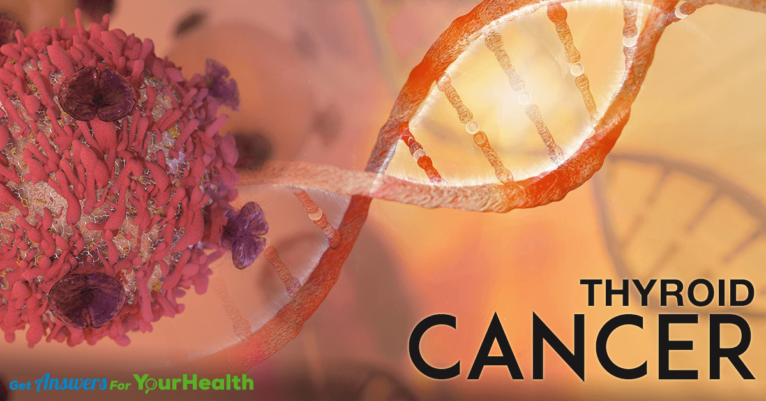1) Grab a FREE copy (Value $14.95) of one of my books Thyroid Symptom Overload
Just pay shipping $7.95 for any US orders. Or, if you want to pay full price plus shipping, order from Amazon :)
2) Take our Thyroid Quiz today and find out what "Thyroid Type" you have
This quiz will help you quickly discover where your symptoms are stemming from.
3) Join Our Thyroid Advocate Membership Site - Natural Thyroid Academy
FREE for a limited time. No credit card required.
4) Work with me and my team privately
Schedule your FREE 15 minute phone consultation and we can find out the best way to help you specifically.
Most individuals have little knowledge about thyroid cancer as it was not that common. However, now it has been the talk of the town as many people are diagnosed with thyroid cancer. The incidence of thyroid cancer has increased with time, but many people have been treated with better treatment options these days.
What Is The Thyroid?
It is a gland which is located under the larynx (voice box) at the front of the neck. The thyroid comprises of 2 parts or lobes. The tissue known as “isthmus” forms a connection between the two nodes. The thyroid gland releases the hormones which regulate the body’s energy. Following are the two hormones produced by thyroid: i.e., Calcitonin and thyroid hormones. Follicular cells of thyroid produce thyroid hormones while C cells produce Calcitonin.
Cancer Cells:
Cancer begins in the thyroid cells which are the building blocks of thyroid tissue. Thyroid cells form and divide to produce new cells. With time, healthy cells die and are replaced by new cells. However, sometimes there is a mutation in their process. The body stops forming new cells when required, and the old cells do not die on their time. The buildup of these extra cells forms a tissue mass which is termed as nodule/growth/tumor.
Symptoms Of Thyroid Cancer:
The symptoms of thyroid cancer are:
- Swelling or lump in the neck (most standard)
- Pain in ears and neck.
- Trouble swallowing with constant wheezing.
- Hoarse voice.
- A frequent cough.
Causes Of Thyroid Cancer:
Following are the causes of thyroid cancer:
- DNA change is the leading cause of thyroid cancer which can either be inherited or as you age older.
- Radiation to the head and neck
Thyroid Nodules:
Thyroid nodules may be benign or malignant.
Benign: it is not harmful, does not invade or spread to other body parts or tissues. It does not need removal.
Malignant: it may result in a life-threatening condition. It can invade or spread to other body parts or tissues. It needs to be removed and destroyed however it may return.
The cells of the thyroid cancer spread by breaking their connection with the tumor.
Pathways Of Spreading:
The pathways of spread involve:
-lymph vessels
-lymph nodes
-blood vessels (from which it spreads to liver, lungs, and bones)
Types Of Thyroid Cancer:
There are various types of thyroid cancer:
- Papillary
- follicular
- medullary
- anaplastic
Papillary: the most common type of thyroid cancer which begins in the follicular cells. It starts with slow growth. Papillary cancer, if diagnosed at earlier stages, has a good prognosis for most people.
Follicular: the second most commonly occurring thyroid cancer. This type of cancer begins slowly in follicular cells. If follicular thyroid cancer is diagnosed at early stage, it also has a good prognosis for most people.
Medullary: it is not that common. It grows slowly in the C-cells where it produces the high amount of Calcitonin. It can be treated if found at an early stage before it spreads. It is a genetic type of cancer which runs in the families because of the RET gene. The disease may occur alone in the form of common medullary thyroid cancer or association with other diseases such as Multiple Endocrine Neoplasia. Your primary medical doctor might suggest a blood test to identify the changes in RET gene. When the physician determines the modification of the gene, he will advise you frequent lab tests or a surgical procedure for thyroid removal.
Anaplastic: the least common type of cancer in people aged above 60. This kind of cancer starts in follicular cells and spreads rapidly. It can be difficult to control anaplastic thyroid cancer.
Diagnostic Tests Thtat Can Be Performed By Your Primary Medical Doctor:
1) Physical exam
2) Blood tests for checking the abnormal blood levels of TSH. High or low amounts of TSH indicate that the thyroid is not working like it should. For medullary thyroid cancer, the doctor will usually order Calcitonin levels and other blood tests.
3) Ultrasound: it allows your doctor to check the size and shape of the nodule. Check whether your nodules are fluid-filled or solid in consistency. The nodules which are fluid-filled are a negative sign for cancer while the solid nodules are often a positive sign for cancer.
4) Thyroid Scan/ PET scan (Positron Emission Tomography):
Your medical doctor can order a thyroid scan. You need to swallow a small amount of radioactive iodine which travels in the bloodstream. If the nodules take more amount of radioactive iodine, then they are termed as hot nodules which are noncancerous. However, nodules with less amount of radioactive iodine are termed as cold nodules which are usually cancerous.
5) Biopsy test: your doctor might perform tissue biopsy via;
-Using a thin needle
-Through surgery
Staging:
If your biopsy tests are positive for cancer, your medical doctor will want to learn the stage of your present disease. The biopsy helps the doctor to identify the best treatment options. Staging is based on the nodule size and the invasion of cancer to different tissues or body parts. Thyroid cancer spreads more commonly to the neck tissues or lymph nodes. It can also spread to the bones and lungs. The proliferation of thyroid cancer cells to different organs of the body is termed as metastasis.
Staging requires one of the following tests:
1) Ultrasound
2) MRI
3) Ct scan
4) Chest X-ray
5) Whole body scans
Consult Your Medical Doctor:
Following are the treatment options provided by medical doctors to individuals who have thyroid cancer:
1) Surgery
2) Thyroid hormone treatment
3) Radioactive iodine therapy
4) External radiation therapy
5) Chemotherapy
Your doctor may also utilize multiple treatment options. For example, in papillary cancer, your doctor may advise you for surgery, radioactive iodine, and/or thyroid hormone treatment. The treatment depends entirely on the type of thyroid cancers along with nodule size and means of spread. Your primary doctor might refer you to a specialist; an endocrinologist, surgeon, medical oncologist, or nuclear medicine doctor.
1) Surgery: most individuals with thyroid cancer need to undergo a surgical procedure. There are two options which your doctor might choose according to the condition:
– Removal of the entire thyroid gland by giving an incision in the neck. If some portion of the thyroid gland cannot be removed, the doctor might decide to damage that tissue later by radioactive Iodine therapy. The surgeon removes the tissues and lymph nodes invaded by the cancerous cells. If the cancer spreads beyond the neck, the doctor might suggest surgery, external radiation therapy and radioactive iodine therapy.
– Removal of lobe: individuals with papillary and follicular thyroid cancer might have a small tumor and involvement of one part of the thyroid gland. For this condition, the surgeon will remove the isthmus and one lobe of thyroid gland.
Post thyroid surgery: you might feel pain and discomfort for few days. After the thyroid removal, most people require pills for hormonal replacement. Surgery may damage the nerves and muscles associated with the thyroid gland. This loss might result in voice problems or one shoulder lower than the other one.
2) Thyroid Hormone treatment:after thyroid surgery, the patients need to have medication prescribed by your medical doctor for the replacement of thyroid hormones. The thyroid medicines are also utilized for the treatment of follicular and papillary thyroid cancer.
The medications may also result in adverse effects such as weight loss, sweating, or feeling hot. Increased thyroid hormones can lead to chest pain, cramps, fast heart rate and diarrhea. However, decreased thyroid hormones may lead to weight gain, tiredness, cold intolerance, dry hair, and skin.
3) Radioactive iodine therapy:the treatment includes I-131 which is used for treating the follicular and papillary thyroid cancers by the doctor. However, anaplastic and medullary tumors do not respond to the iodine therapy. Before taking this medicine, you should start consuming a particular diet which does not contain Iodine. Please speak to your medical doctor about this.
Side effects: in men loss of fertility is seen while in women you should avoid pregnancy for at least a year. Other side effects include taste loss, loss of smell senses and dry mouth for short periods.
4) External radiation therapy: it can help in the treatment of all type of cancers which do not respond to surgery or Iodine therapy. External radiation therapy uses the high-energy rays. Side effects include a sore throat, swallowing problems, dry skin with redness and appear to be tender.
5) Chemotherapy:it is used to treat anaplastic and medullary thyroid cancer. Most of the chemotherapy drugs are given I/V. Please consult with your medical doctor regarding the options that can most benefit you.
Conclusion:
It is advisable to have a complete check-up after every six months. Examine yourself by sliding your fingers to the prominent cartilage in the front of your neck. If you feel a bulge or lump then definitely seek help from your medical doctor.
References:
www.webmd.com/cancer/tc/thyroid-cancer-topic-overview
https://www.cancer.gov/publications/patient-education/wyntk-thyroid-cancer
https://www.cancer.gov/publications/patient-education/thyroid.pdf
http://www.foxnews.com/health/2015/10/01/15-thyroid-cancer-facts-everyone-should-know.html
http://nw-ent.com/6-things-you-need-to-know-about-thyroid-cancer/
http://www.huffingtonpost.com/amy-graeber/thyroid-cancer-things-to-know_b_3319897.html
http://www.hormone.org/diseases-and-conditions/thyroid/thyroid-cancer
http://blog.dana-farber.org/insight/2013/09/thyroid-cancer-five-things-you-need-to-know/








